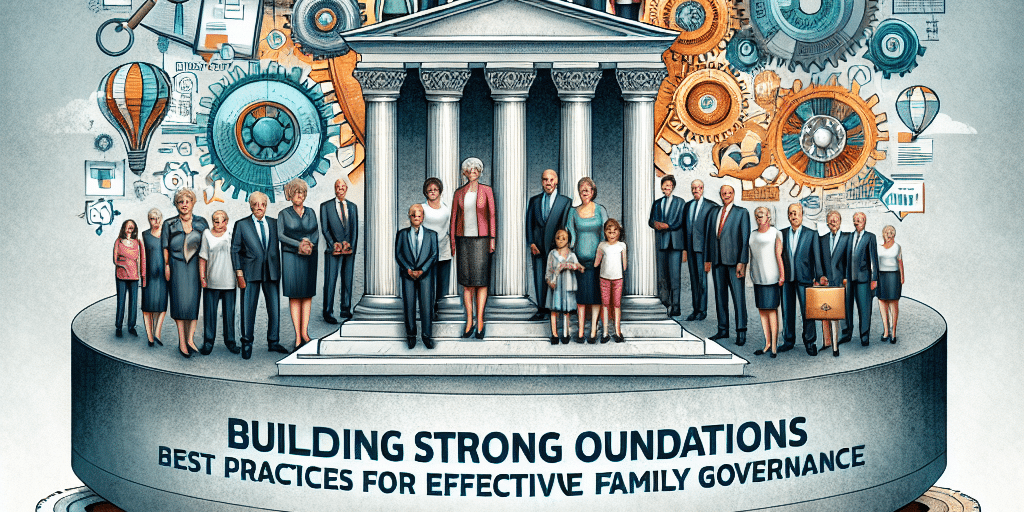Building Strong Foundations: Best Practices for Effective Family Governance
In an increasingly complex world, families with significant wealth, entrepreneurial ventures, or shared interests are often faced with unique challenges that can strain their relationships and threaten the longevity of their legacies. As dynamics shift across generations, the need for a structured approach to family governance becomes paramount. Effective family governance not only preserves family harmony but also aligns family members towards common goals and values. Here we will explore best practices for establishing and maintaining strong family governance.
1. Establish a Family Mission and Vision
The foundation of effective family governance lies in a clear mission and vision statement. This should communicate the family’s shared values, aspirations, and long-term objectives. Involving family members in the creation of these statements promotes buy-in and ensures that all voices are heard. A well-defined mission and vision serve as guiding principles that inform decision-making and align the family’s efforts toward their desired future.
2. Create a Family Governance Structure
A robust governance structure is essential for overseeing family activities and assets. This structure can include:
Family Council: A governance body comprised of family members that meets regularly to address issues, share updates, and plan collective actions. The council should have clear roles, responsibilities, and an agenda to ensure efficiency in discussions.
Family Constitution: A formal document that outlines the values, roles, decision-making processes, and conflict resolution mechanisms. This constitution serves as a reference point, reducing ambiguity and fostering transparency in governance.
- Advisory Board: An external advisory board comprising professionals or experienced non-family members can provide valuable insights and guidance on governance matters, succession planning, and strategic initiatives.
3. Engage in Regular Communication
Open and honest communication is the bedrock of effective family governance. Creating regular forums for family members to share their thoughts, ideas, and concerns can mitigate misunderstandings and build trust. These forums can take various forms, including:
Regular Meetings: Scheduled gatherings provide a platform for discussion on important matters, ensuring that all family members have the opportunity to contribute.
Newsletters or Updates: Disseminating information through newsletters or updates can keep family members informed about ongoing projects and initiatives, reinforcing a sense of unity.
- Feedback Mechanisms: Anonymous feedback tools or surveys allow family members to voice concerns or suggestions freely, fostering an inclusive environment.
4. Focus on Education and Development
Investing in family members’ education and personal development is crucial for ensuring they are equipped to engage in governance and contribute effectively. Initiatives may include:
Workshops and Retreats: Organizing workshops that address topics such as financial literacy, leadership development, and conflict resolution can empower family members and enhance their governance capabilities.
Mentorship Programs: Establishing mentorship relationships between experienced family members and younger generations helps transfer valuable knowledge and prepares the next generation for future responsibilities.
- External Training: Encouraging family members to attend external courses or sessions on governance and fiduciary responsibilities can provide them with essential skills and a broader perspective.
5. Implement Succession Planning
Succession planning is vital for ensuring that the family’s values and legacy are carried forward. This process involves preparing for leadership transitions, whether in family businesses or governance roles. Best practices include:
Identifying and Developing Future Leaders: Recognizing potential leaders within the family early on and providing them with mentorship and training will smooth the transition process.
Creating a Succession Plan: A formalized succession plan outlines the timeline, qualifications, and training required for successors. This minimizes uncertainty and reinforces commitment to the family mission.
- Reviewing and Updating Plans Regularly: Succession plans should be living documents that evolve with the family dynamics, institutional changes, and external circumstances.
6. Encourage Philanthropy and Community Engagement
Fostering a culture of giving back strengthens family bonds while creating shared experiences. Engaging in philanthropy or community service as a family:
Strengthens Relationships: Joint efforts in charitable activities promote teamwork and reinforce family values.
- Encourages Reflection on Values: Discussing philanthropic goals aligns family members around shared values while allowing for meaningful conversations about their impact on society.
Conclusion
Building a strong foundation for effective family governance requires intentional effort, clear communication, and commitment from all family members. By establishing a robust governance structure, prioritizing education and development, and engaging in activities that foster unity, families can navigate challenges and preserve their legacies for future generations. Ultimately, effective family governance is not merely about managing wealth or assets; it’s about nurturing relationships that stand the test of time, ensuring that the family’s core values and vision guide them into the future.











